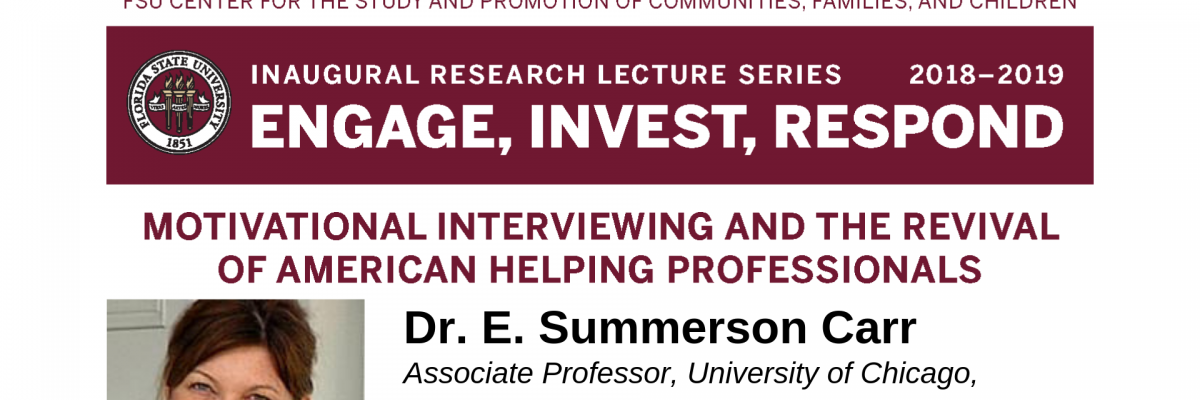Motivational Interviewing and the Revival of American Helping Professionals

This message has been approved by Dr. Jim Clark, Dean and Professor of the FSU College of Social Work, for distribution to students, faculty and staff.
FRIDAY, MARCH 8, 3-4 P.M.
UNIVERSITY CENTER C, ROOM 5301
FREE FOR ALL ATTENDEES. CEU'S AVAILABLE.
DR. E. SUMMERSON CARR
Associate Professor, University of Chicago, School of Social Service Administration, The Department of Anthropology, and the Center for the Study of Gender and Sexuality
Motivational interviewing (MI) is an American behavioral therapy originally developed for the treatment of problem drinking in the early 1980s. In the years since, this treatment method has spread dramatically across professional fields including primary care medicine, counseling psychology, corrections, nursing, nutrition, and weight control, social work, and dentistry. MI’s official status as an evidence-based practice and a political economy that privileges brief (and therefore inexpensive) interventions have doubtlessly paved the way for MI’s impressive travels across these varied professional fields. At the same time, MI’s successful dissemination has radically depended upon the boots-on-the-ground labor of a devoted corps of several thousand helping professionals who, having felt revived by their own training in MI, take up training the method to others as their vocation.
Drawing on an extended, multi-sited ethnographic study of MI training, this talk theorizes the cultural dimensions of treatment dissemination, including the ethical, effective, and spiritual commitments of disseminators. I further argue that MI training sheds light on the depleting conditions of labor within the helping professions, conditions that trainers believe MI is specially equipped to target and transform.
Biography: E. Summerson Carr is an Associate Professor at the School of Social Service Administration, and an affiliate of the University of Chicago Department of Anthropology and the Center for the Study of Gender and Sexuality. As a sociocultural and linguistic anthropologist who conducts ethnographic studies of social work and allied professions, Professor Carr highlights the cultural dimensions of professional practices and institutions. More specifically, her work to date examines how culturally rooted ideas about language and personhood shape clinical interventions and social welfare administration, which in turn, refine these ideas by processing people and problems in accordance with them. She sustains broader interests in the cultural history of American psychotherapies, the politics of communication, the ethnography of complex institutions, and the anthropology of the United States.
Parking: Parking is available in the Visitor Parking lot adjacent to the University Center, Building C.
